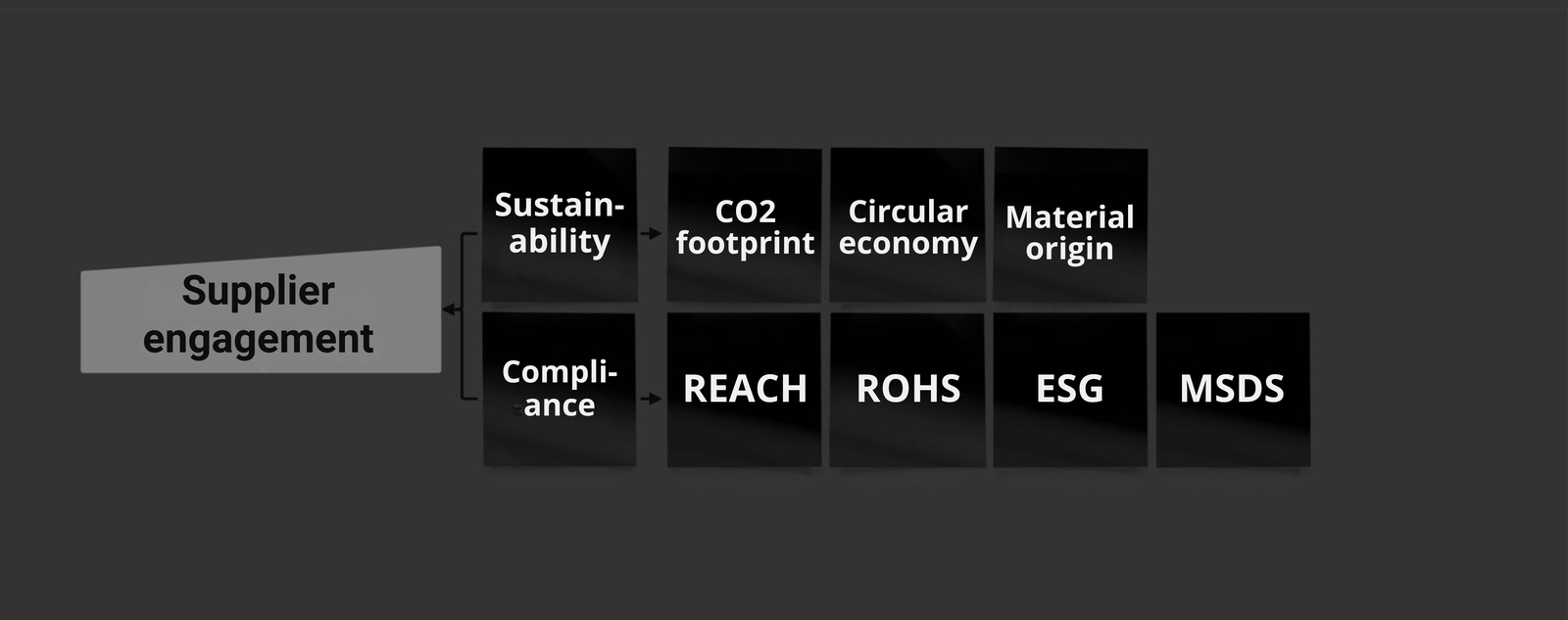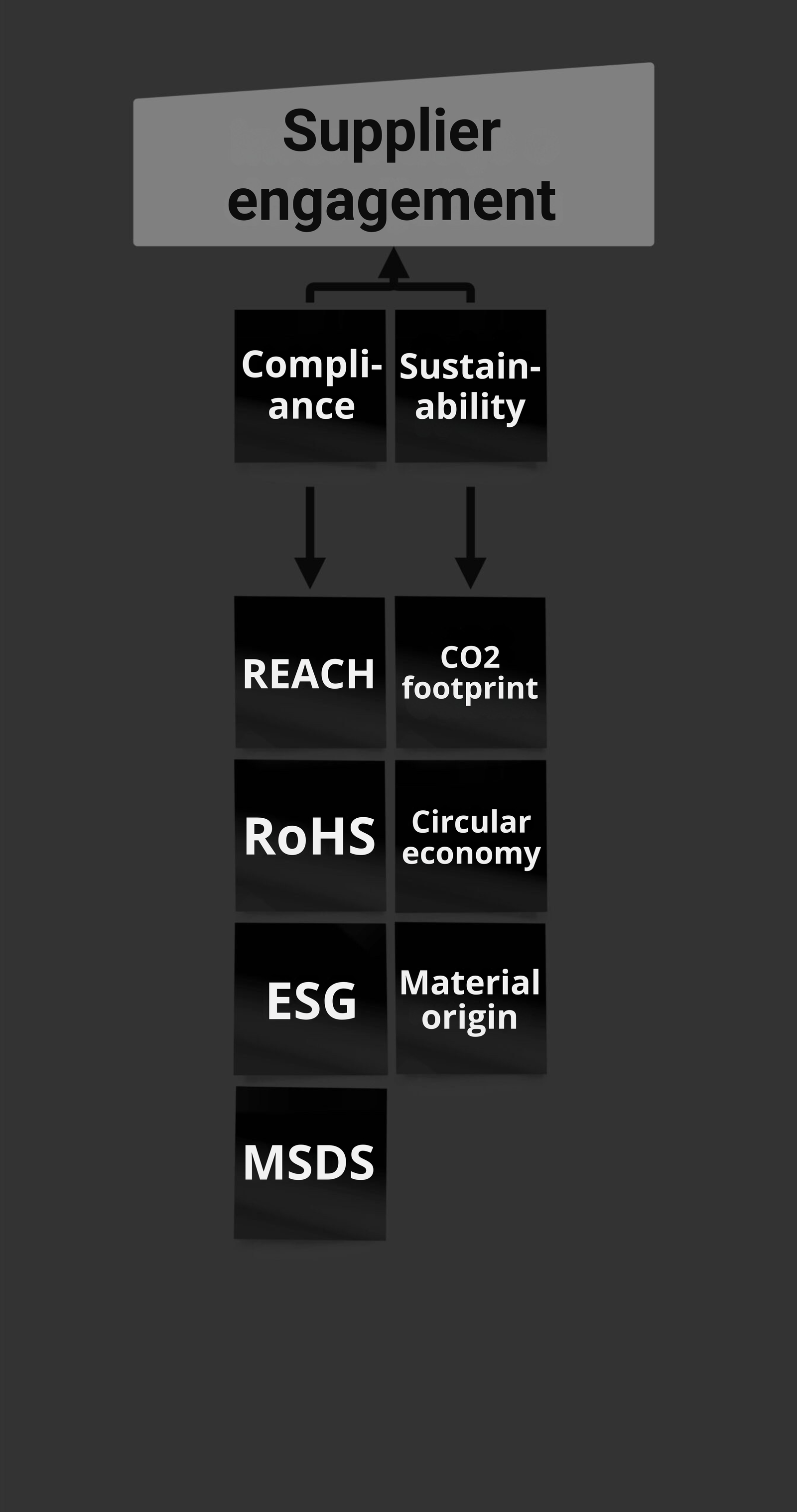

Supplier engagement
Why is it necessary to have proper data and information exchange with your suppliers?
With significant advantages in attracting financial capital from an increasing number of investors focused on sustainable production, and in an increasingly stringent regulatory environment within the European Union related to sustainable and responsible business practices, it is becoming crucial for companies from both the EU and third countries to actively engage in collecting detailed information about the products they source from their suppliers—commonly known as supplier analysis. Transparency in the supply chain not only improves business efficiency but also ensures compliance with new EU regulations, which increasingly require data on the composition, origin, and environmental impact of these products.
This information is particularly important for compliance with upcoming EU regulations under the EU Green Deal, and some of these regulations include: Corporate Sustainability Reporting Directive (CSRD) and Carbon Border Adjustment Mechanism (CBAM), which require companies to accurately report on sustainability and product emissions throughout the entire supply chain. For example, CSRD will mandate companies to provide comprehensive information on environmental, social, and governance (ESG) factors related to their products and suppliers. Meanwhile, CBAM will require data on the CO2 footprint of imports to support the green transition in alignment with EU goals. Additionally, regulations such as REACH, RoHS, and MSDS also require the submission of specific information to ensure compliance with safety, environmental, and chemical substance standards.
This is precisely why actively collecting information and having timely access to product data has become a fundamental prerequisite for building a sustainable business and maintaining competitiveness in the European market. Ensuring compliance with these regulations allows companies to meet regulatory requirements and contribute to European sustainability standards.
Read more - which companies can benefit the most?less..
Which companies can make advantage?
In addition to the extensive range of other laws related to the European Green Deal, the current focus is on the CSRD and CBAM regulations. The CSRD regulation will impact all large, medium, and small enterprises (whose securities are traded on a regulated market within the Union—excluding micro-enterprises), both within and outside the EU, that exceed a certain number of employees or a specific net revenue threshold. On the other hand, the CBAM regulation and its enforcement are limited to sectors with high carbon dioxide (CO₂) emissions and products that have a significant environmental impact. These sectors include:
Energy sector – CBAM applies to electricity production, as power plants often have high CO₂ emissions due to the use of non-clean fuels in the generation process.
Steel and iron industry – Steel and iron production is among the largest polluters during the manufacturing process due to the high temperatures required for metal smelting. Therefore, it is included in the CBAM regulation list.
Cement industry – Cement production also generates significant CO₂ emissions, as the manufacturing process is highly energy-intensive. As a result, the new CBAM regulations cover this sector.
Fertilizer production – Fertilizer production, especially nitrogen-based fertilizers, generates high CO₂ emissions and other gases that are highly harmful to the environment. This sector is also included in the CBAM regulation.
Aluminium industry – As an energy-intensive product, aluminium is a major CO₂ emitter during production, which is why it is often associated with high emissions and is included under the CBAM regulation.
- Hidrogen production – Also included among the six initial sectors covered by the CBAM regulation.
Other industries are currently not part of the CBAM regulation and its reporting requirements. However, after the initial implementation of this law, there is a possibility of expanding it to include other energy-intensive and environmentally impactful sectors, such as the paper, wood, and chemical industries.
Additionally, REACH covers product information for items such as toys, textiles, rubber, and electronics, while RoHS focuses on electrical products, and MSDS applies to hazardous chemicals.
Read more - how can our consulting services help?less..
Services we offer
As many of these requirements are new and demand extensive resources, our services play a crucial role in supporting companies in collecting, organizing, and aligning key data related to specific regulations. Beyond compliance, we also help businesses enhance their attractiveness to the financial investment market. Some of the services we offer include:
Data collection and centralization – We help you collect all necessary data from suppliers, manufacturers, and internal departments, then centralize the information in one place. This ensures that all data required for regulatory compliance is easily accessible, simplifying analysis and reducing errors that may arise during the information exchange process.
Processing of collected data based on specific regulations
Support in updating and creating Material Safety Data Sheet (MSDS) documents.
Consultation and training – We provide expert guidance and employee training to enhance understanding of regulations, requirements, and reporting procedures.
Preparation of Life Cycle Analysis (LCA) product reports – Includes all collected data, methodology, and conclusions. These reports are essential for companies seeking transparent reporting to investors and partners.
Our services enable monitoring, compliance, and timely fulfilment of strict and complex legal frameworks.
